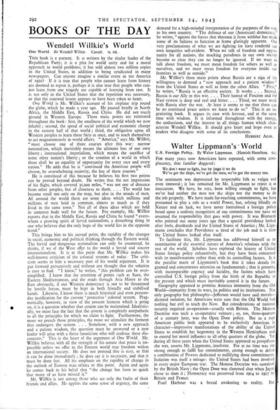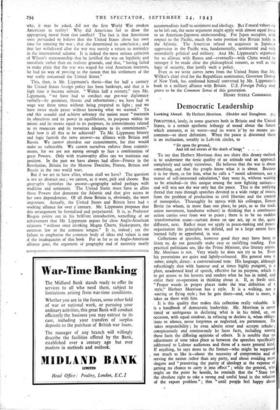Walter Lippmann's • World
U.S. Foreign Policy. By Walter Lippmann. (Hamish Hamilton. 6s.)
FOR many years now Americans have repeated, with some com- placency, that familiar doggerel:
We don't want to fight, but by jingo if we do We've got the ships, we've got the men, we've got the money too.
The sentiment was deprecated by respectable folk as vulgar and even immoral; has remained for Mr. Lippmann to reject it as
inaccurate. e have, he says, been willing enough to fight, but we've had neither the men nor the ships nor the money to do the job properly. We have made far-reaching commitments, we have presumed to play a role as a world Power, but, relying blindly on Nature and on luck, we have never formulated a foreign policy based upon a realistic recognition of our commitments nor have we assumed the responsibility that goes with power. It was Bismarck who pointed out many years ago that a special providence looked after fools, drunkards and the Jinited States of America ; Mr. Lipp- mann concludes that Providence is tired of the job and it is time the United States looked after itself.
To facilitate this, Mr. Lippmann has addressed himself to an examination of the essential nature of America's relations with the rest of the world. Scholars have explored the history of United Statei foreign policy exhaustively, but they have been. concerned with its manifestations rather than with its controlling factors. It is the peculiar merit of Lippmann's book that it takes details for granted and concentrates attention on fundamentals ; that it presents, with incomparable cogency and lucidity, the factors which have controlled U.S. foreign policy from the birth of the Republic to the present and which must inevitably control it in the future.
Geography appeared to promise America immunity from the Old World—immunity from its wars, its politics and its institutions. Not only geography but philosophy—Jefferson would have said morals— dictated isolation, for Americans were sure that the Old World had nothing but evil to teach the New. But considerations of national security required co-operation—usually with Britain. The Monroe Doctrine was such a co-operative venture ; so, too, three-quarters of a century later, was the Open Door policy. But to a rapt American public both appeared to. be exclusively American in character—impressive manifestations of the ability of the United States to establish her hegemony in the Western Hemisphere and to extend her moral influence to all other quarters of the globe. Yet during all these years when the United States appeared so prosperous she was, asserts Mr. Lippmann, insolvent. For at no time was she strong enough to fulfil her commitments, strong enough to defeat a combination of Powers dedicated to nullifying those commitments. Isolation was itself a mirage : the United States had been involved in every major European war. The Monroe Doctrine was sustained by the British Navy ; the Open Door was slammed shut when Japan chose to slam it ; Democracy was preserved from 1914 to 1917 by Britain and France.
Pearl Harbour was a brutal awakening to reality. But why, it may be asked, did not the first World War awaken Americans to reality? Why did Americans fail to draw the appropriate moral from that conflict? The fact is that Americans were persuaded to believe that the United States chose her own time for entering the war ; that she determined its conclusicn ; and that her withdrawal after the war was merely a return to normalcy in the international scheme. It is indeed the -most serious criticism of Wilson's statesmanship that he justified the war on legalistic and moralistic rather than on realistic grounfla, and that, " having failed to make plain that the war was waged for vital American interests, he had no way of proving to the nation that his settlement of the war really concerned the United States."
This, then, is Mr. Lippmann's thesis—that for half a century the United States foreign policy has been bankrupt, and that it is high time it became solvent. " Within half a century," says Mr. Lippmann, " we have had to conduct our pre-war diplomacy 'verbally—by promises, threats and exhortations ; we. have had to wage war three times without being prepared to fight - and we have twice made peace without knowing what we waned." To end this scandal and achieve solvency the nation must " maintain its objectives and its power in equilibrium, its purposes within its means and its means equal to its purposes, its comminnents'related to its resources and its resources adequate to its commitments." And how is all this to be achieved? To Mr. Lippmann history and logic furnish the same answer—an alliance with Britain and Russia. •We cannot abandon our commitments, for that would make us vulnerable. We cannot ourselves enforce those commit-
ments, for we are not with enough to face a combination of great Powers. Only with trustworthy allies can we maintain -our position. In the past we have always had allies—France in the Revolution, Britain for the Monroe Doctrine, France, Britain and Russia in the two world wars.
But if we are to have allies, whom shall we have? The question is nor an abstract one ; we cannot, as it were, pick and choose. But geography furnishes the answer—geography salted perhaps with tradition and sentiment. The United States must have as allies those Powers that dominate the Atlantic and that give access to her own dependencies. Of all these Britain is, obviously, the most important. Actually, the United States and Britain have had a working alliance for over a 'century. Mr. Lippmann proposes that this arrangement be formalised and perpetuated. It is, as Professor Brogan points out in his brilliant introduction, something of air achievement that Mr. Lippmann argues for close Anglo-American relations "without once invoking Magna Charta, Shakespeare, the common law or the common: tongue." It is, indeed ; yet the failure to emphasise the common body of ideas and values is one of the inadequacies of this book. For as far as an Anglo-American alliance goes, the argument of geography and of necessity neatly
accommodates itself to sentiment and ideology. But if moral values are to be left out, the same argument might apply with almost equal force to an American-Japanese understanding. For Japan occupies, with respect to the Pacific, much the same position that Britain holds in the Atlantic. The American refusal to acquiesce in Japanese aggression in the Pacific was, fundamentally, sentimental and only secondarily political and military. And Mr. Lippmann's argument for an alliance. with Russia and—eventually—with China would be stronger it he made clear the philosophical reasons, as well as the
logic of security, that justify such- a policy. -
Even as we write comes news from the United States that Mr. Willkie's chief rival for the Republican nomination, Governor Dewey of New York, has confessed himself converted by. Mr. Lippmann's book to a military alliance with Britain. U.S. Foreign Policy may prove to be the Common Sense of this generation.
' HENRY STEELE COMMAGER.



























 Previous page
Previous page